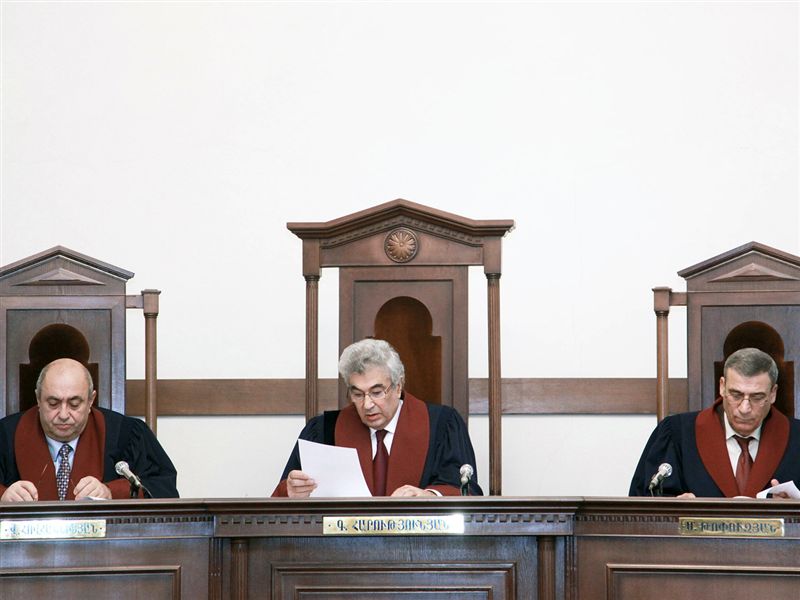
Turkey Reacts to Armenian Constitutional Court’s Decision on Protocols
Publication: Eurasia Daily Monitor Volume: 7 Issue: 17
By:

Since Turkey and Armenia finally signed the groundbreaking protocols for the normalization of their relations in October 2009, their progress has been far less impressive. The Turkish and Armenian governments’ inability or unwillingness to counter domestic opposition stalled the parliamentary ratification process. Recently, both parties indicated that rather than exploring ways to escape a looming stalemate, they prefer to engage in a blame game.
On January 12, the Armenian constitutional court issued a short statement announcing that the protocols were in conformity with the constitution, which raised expectations that the Armenian parliament might proceed with the ratification process. Turkish analysts interpreted the announcement as Yerevan’s acting in line with the spirit of normalization. They maintained that although the Turkish government argued that Turkey’s ratification would depend on progress on the Karabakh issue, Armenia’s proactive step would put enormous pressure on Turkey to reciprocate (Milliyet, January 16).
Later, the court published a detailed statement elaborating the grounds of its decision (https://www.concourt.am/english/decisions/common/pdf/850.pdf). Turkish official sources immediately raised criticisms of the decision, on the grounds that it was against the essence of the normalization process.
For the Turkish side, the major source of concern is the court’s reference to the Armenian Declaration of Independence. The court says that the interpretation and application of the protocols should be in compliance with the Armenian constitution and paragraph 11 of the Armenian Declaration of Independence, which states: “The Republic of Armenia stands in support of the task of achieving international recognition of the 1915 Genocide in Ottoman Turkey and Western Armenia.”
Turkey insists that the protocols did not refer to the Armenian genocide claims. The protocols noted the parties’ agreement to launch a dialogue process, including the formation of a committee of historians, to handle historical issues. If the Armenians continue to consider the events of 1915 as an undisputable genocide, in the Turkish view, the court’s verdict in effect renders the normalization process conditional on Turkey’s recognition of Armenian claims. This practically brings the two sides to the point before they initiated the thaw. Considering that Turkey promoted the committee of historians in particular, and normalization in general, as a means to resolve the “genocide issue,” this provision caused further concern in Ankara (Milliyet, January 20).
Another point that angered Turkey was the verdict’s conclusion that the mutual obligations were “exclusively of a bilateral inter-state nature.” The Turkish side believes this clause seeks to forestall Turkey’s efforts to establish linkages between Turkish-Armenian thaw and the Azeri-Armenian process.
The Turkish foreign ministry issued a statement maintaining that “this decision contains preconditions and restrictive provisions which impair the letter and spirit of the protocols” (www.mfa.gov.tr, January 18). Similarly, the Turkish Foreign Minister Ahmet Davutoglu expressed his displeasure with this development, and communicated Turkey’s concerns to US Secretary of State Hillary Clinton and Swiss Foreign Minister Micheline Calmy-Rey, who mediated the talks between Armenia and Turkey. Davutoglu maintained that the court effectively revised the protocols and created a new legal situation. He also added that Turkey would remain committed to the process, and preserve the wording and spirit of the protocols (Hurriyet, January 22).
Ankara’s prompt reaction invited the ire of the Armenian side. Armenian Foreign Minister Edward Nalbandian telephoned Davutoglu. While he inquired about Ankara’s statements critical of Armenia, Davutoglu conveyed Turkey’s concerns. On January 22, Nalbandian criticized Ankara’s position, arguing that Turkey was manipulating the court ruling to block the progress of normalization. He threatened that the process might collapse if Turkey did not ratify the protocols and “continue… to speak in the language of preconditions, make some linkages and obstruct progress in this process” (www.asbarez.com, January 22).
The tensions seem ongoing, with Turkish press speculation that the foreign ministry is drafting a statement through which Ankara seeks to convey officially its concerns over the court decision to Armenia and other international actors. In the Turkish view, since the court in effect attaches certain preconditions to an international agreement, it would also violate international law (Today’s Zaman, January 24).
The crux of the debate appears to hinge on whether the court is merely proposing guidelines for the interpretation of the protocols or setting preconditions. On this question, there are different interpretations being proposed in both Turkey and Armenia. Meanwhile, US Assistant Secretary of State Philip Gordon said that “we view the court decision as a positive step forward… [it] permits the protocols, as they were negotiated and signed, to move forward towards parliamentary ratification, and does not appear to limit or qualify them in any way” (www.armenianow.com, January 23). Armenian officials welcomed this statement as a vindication of their rightfulness and American support for their position (ANKA, January 24).
Yet, the official Turkish position remains that Armenia is inserting undue preconditions which must be addressed to avoid any later misunderstanding. Though this might be a principled argument, Ankara’s own attitude has been equally problematic. Turkey predicated its rapprochement with Armenia on the assumption that, in parallel to its dialogue with Armenia, there would be progress toward the resolution of the Azeri-Armenian dispute. Ankara hoped to eliminate the objections from Azerbaijan and domestic opposition. Although the Turkish parliament debated the protocols, the government has not submitted them for ratification until Armenia signals some sort of concession to Azeri demands on the Karabakh dispute. Uncomfortable with these developments, the Armenian side views Turkey’s attitude as setting out a set of preconditions.
Although Turkey approached the Western powers and Russia to use their leverage over Yerevan to move the Armenian-Azeri talks forward, it so far has failed in those efforts. The international community appears to reject linking the two issues, which in the coming days may place Turkey in a difficult position. If Turkey continues to delay the ratification of the protocols and Baku and Yerevan fail to reach a solution, Ankara might have a hard time explaining its position to the international community. Pressure on Turkey to change its position is likely to accelerate. Since Ankara is walking a tightrope, Yerevan interprets Turkish criticism of the court decision as simply creating excuses to justify the delays in ratification.
In this blame game, both sides are increasingly referring to each other’s “deviation from the mutual understanding” and “betrayal of the spirit of normalization.” This spiraling of accusations demonstrates the fragility of the rapprochement and the parties’ reluctance to counter domestic opposition.




